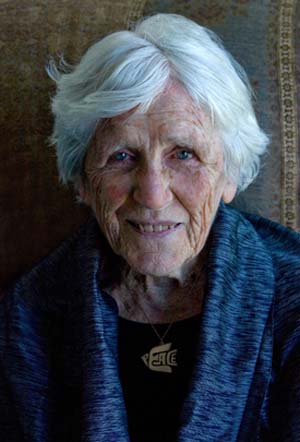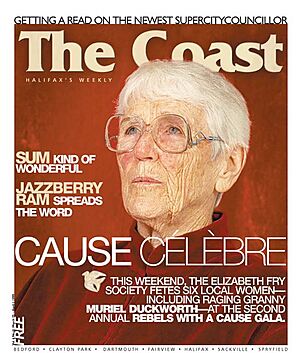Muriel Duckworth facts for kids
Quick facts for kids
Muriel Duckworth
CM ONS
|
|
|---|---|

Portrait commissioned in honour of Duckworth's 100th birthday
|
|
| Born |
Muriel Helen Ball
October 31, 1908 Austin, Quebec, Canada
|
| Died | August 22, 2009 (aged 100) Magog, Quebec, Canada
|
| Alma mater | |
| Occupation | Social activist |
| Years active | 1925–2009 |
| Spouse(s) |
Jack Duckworth
(m. 1929; died 1975) |
| Children | 3, including Martin and Eleanor |
Muriel Helen Duckworth was a Canadian woman who worked tirelessly for peace, women's rights, and social justice. She was born on October 31, 1908, and lived to be 100 years old, passing away on August 22, 2009. Muriel was a pacifist, meaning she strongly believed that war and violence are wrong. She was also a feminist, someone who champions equal rights and opportunities for women.
Muriel believed that war hurts women and children the most. She thought it stopped society from being fair. She felt that money spent on weapons should instead be used to help people in need. She famously said, "war is stupid."
She helped start the Nova Scotia Voice of Women for Peace, a group that worked for peace. She also led protests against Canada's quiet support for the war in Vietnam. Muriel was the first woman in Halifax to run for a seat in the Nova Scotia legislature. She also worked to improve education, housing, and social support in her community.
Later in her life, Muriel joined the Raging Grannies. This group sings funny songs to promote social justice. Muriel received many awards for her work. These included the Order of Canada in 1983 and the Pearson Medal of Peace in 1991.
Contents
Muriel's Early Life
Growing Up in Quebec
Muriel Helen Ball was born on October 31, 1908. Her family lived on a farm in Austin, Quebec, a small village in Quebec. She was one of five children. Their farm was by the beautiful Lake Memphremagog. Muriel loved the nature around her. She returned to a cottage near the lake almost every summer of her life.
Her family's farm was good for animals like chickens and cows. But the land wasn't great for growing crops. Muriel's mother earned extra money by having summer guests stay at their home. Her father sold lightning rods.
Muriel went to a one-room school until she was seven. Then she moved to a bigger school in Magog, Quebec. In 1917, her father sold the farm. He bought a grocery and feed store in Magog. The next year, her mother opened a tea room and boarding home. Muriel and her sisters helped their mother with cleaning and serving guests. This helped Muriel overcome her shyness.
Her Mother as a Role Model
Muriel's mother, Anna Ball, was a successful businesswoman. She also helped her community through her church and other groups. Anna ran a boarding house. She often fed hungry men and gave shelter to young homeless women. She also raised money to start a home for older people. She even began a community library.
Muriel looked up to her mother. She also admired Nellie McClung and Agnes Macphail. These were political activists who fought for women's rights. Muriel later said that her mother's example led her to become a social activist. Her mother believed she could make a positive difference, and she did.
School Days
After high school, Muriel went to the Ontario Ladies College. This was a school for girls in Whitby, Ontario. Her aunt, Abbie Ball, taught there and paid Muriel's school fees. The college taught languages, history, math, and piano.
Muriel was very shy. She didn't join the drama club, even though her aunt was the drama coach. She also missed her home. Once a month, speakers from the United Church of Canada visited the school. Muriel especially remembered James Endicott. He was a missionary in China who later became a church leader and a lifelong friend.
University Life
McGill University Years
Muriel went to McGill University in Montreal. She received some money from the college and her Aunt Abbie. She studied for a Bachelor of Arts degree. In her last year, she took classes to become a high school teacher.
Teaching in front of students and professors was hard for her. But Muriel hid her fear well. Her professor even praised her for seeming calm. She also tried to overcome her shyness by joining a public speaking contest. She volunteered to take notes at student meetings.
Student Christian Movement
Joining the Student Christian Movement (SCM) at McGill changed Muriel's life. She later said it was the most important part of her college experience. The SCM had small study groups. Students could openly discuss their beliefs. They were encouraged to think for themselves.
For Muriel, these discussions were challenging but also exciting. She learned to question things and think deeply. This was very different from the strict way she had learned before. She said, "This was the beginning of my adult search for truth."
Marriage and Further Studies
In 1926, Muriel met Jack Duckworth. He was also a McGill student and active in the SCM. Muriel was 18, and Jack was 29. Jack was studying to work for the YMCA. He also discovered he was good at preaching. He decided to study theology after getting his Master's degree.
Muriel and Jack got engaged in 1928. Jack then went to the Union Theological Seminary in the City of New York (UTS) for two years. Muriel graduated from McGill in May 1929. A month later, they got married in Montreal. They started their married life in New York while Jack finished his studies.
Union Theological Seminary Experience
Muriel Duckworth also studied at Union Theological Seminary in 1929. She worked part-time with poor teenage girls in Hell's Kitchen, New York. She met these 16- and 17-year-old girls twice a week. She also visited their homes. This showed her what life was like for working-class immigrant families. They lived in small, crowded apartments near noisy elevated trains.
In her studies, Muriel learned about the Social Gospel movement. This movement aimed to improve people's lives through social services and education. This was at the start of the Great Depression. Her teachers included Harry F. Ward, who fought for civil rights, and Reinhold Niebuhr. Muriel connected the Social Gospel with pacifism. She remembered Eugene V. Debs, a labor hero who went to prison for opposing World War I.
Family Life in Canada
Muriel and Jack Duckworth moved back to Montreal in 1930. They started their family there. Their son Martin was born in 1933. Their daughter Eleanor, named after Eleanor Roosevelt, was born in 1935. Their son John was born in 1938.
The family moved to Halifax, Nova Scotia, in 1947. Jack became the general secretary of the YMCA. Muriel worked in adult education. From 1948 to 1962, Muriel was a part-time parent education advisor for the Nova Scotia Department of Education. Jack Duckworth passed away in May 1975 when Muriel was 66 years old.
Muriel's Activism and Achievements

Muriel Duckworth's belief in peace was central to her life. It showed in her religious beliefs and her work with peace groups. She helped start the Nova Scotia Voice of Women for Peace. This was a local part of the national Voice of Women (VOW) organization. She was the National President of VOW from 1967 to 1971.
During her time as president, VOW strongly protested against the Vietnam War. They also criticized the Canadian government for quietly supporting the war. They spoke out against Canada selling weapons to the US military. In 1969 and 1971, Muriel helped arrange visits to Canada by Vietnamese women. These women had been directly affected by the war.
Muriel also worked to organize communities and promote women's issues. In 1971, she helped create the Movement for Citizens' Voice and Action (MOVE). This group worked for better education, housing, and social support in Halifax. Muriel became the first woman in Halifax to run for a seat in the Nova Scotia Legislature. She ran as a New Democratic Party candidate in 1974 and 1978.
In 1976, she helped found the Canadian Research Institute for the Advancement of Women (CRIAW). This group supports research on women's issues. She was president of CRIAW from 1979 to 1980. Later, she helped organize a five-day Women's International Peace Conference in Halifax in June 1985.
Muriel received many awards for her important work. These included the 1981 Governor General's Award in Commemoration of the Persons Case. She also received the Order of Canada in 1983 and the Pearson Medal of Peace in 1991. She was given 10 honorary university degrees. These included degrees from Mount Saint Vincent University and Dalhousie University.
To celebrate her 100th birthday, Oxfam Canada created a special fund. It was named the Jack and Muriel Duckworth Fund for Active Global Citizenship. This honored Muriel and her late husband's work for social justice. Muriel also received the Order of Nova Scotia after her death on September 2, 2009.
Muriel's Last Years and Legacy
In August 2009, Muriel fell and broke her leg at her cottage in Quebec. She was treated in a hospital in Magog, Quebec. Her health got worse. As she received palliative care (comfort care), she reportedly told visitors, "I'm going to leave you now. It's time for me to go. Everything is ready." She added, "Be happy with each other. You have each other. Goodbye, I'm going now."
Her friend, Ursula Franklin, a well-known scholar and peace activist, commented on Muriel's passing. She said Muriel should be remembered as someone who showed that you can change society. You can be critical and still be a respected member of that society. Muriel Duckworth died on August 22, 2009, at the age of 100. Her biographer, Marion Douglas Kerans, said, "She showed women how to become true leaders in their community, and in the world, without losing any feminine grace."
See also
- List of peace activists

